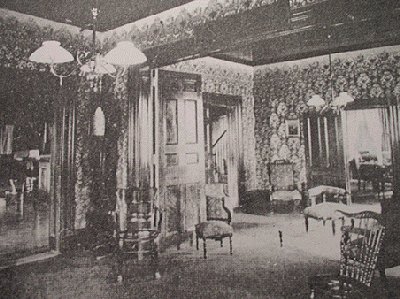- By Dan Veaner
- Around Town
 Print
Print  On August 28th the United States National Park Service made official what Lansing already knew: that Rogue's Harbor Inn is a historical site of national significance. A year after applying, the local landmark was chosen for a place in the National Register of Historic Places. Originally called the 'Central Exchange Hotel' when it was built in 1830, the inn has been used as a hotel, department store, restaurant, and country club. Being part of the National Register cements its place in history and will bring opportunities to preserve the building for future generations.
On August 28th the United States National Park Service made official what Lansing already knew: that Rogue's Harbor Inn is a historical site of national significance. A year after applying, the local landmark was chosen for a place in the National Register of Historic Places. Originally called the 'Central Exchange Hotel' when it was built in 1830, the inn has been used as a hotel, department store, restaurant, and country club. Being part of the National Register cements its place in history and will bring opportunities to preserve the building for future generations."It's a prestige thing to be recognized by the National Register - that this place is important and you are taking care of it," says owner Eileen Stout. "There is some grant money available, too, for exterior preservation and renovations."
Stout hired Historic Ithaca Preservation Services Coordinator Kristen Olson over a year ago to research the inn and write a draft nomination about a year ago. She also met with Lansing Town Historian Louise Bement, who consulted with engineer Bill West and Zeta Sprole. Bement was able to provide a wealth of material to enhance what Stout has collected throughout the years she has owned the inn.

Rogues Harbor Inn then...

... and now
Bement says that owners of the inn have approached her from time to time about applying for the National Register, but were concerned that the designation would restrict them from making improvements to the building. Stout adds that she had that concern until she learned that the restrictions apply largely to the exterior of the building. Projects she has in mind for the exterior are in line with what the National Register would require such as putting all the decorative gingerbread back on the porch, and restoring the brick on the back side of the building. Stout says she couldn't afford to make those restorations on her own, but grants available to buildings on the National Register could make them possible.
Since General Daniel D. Minier built what is reported to be the first brick building in Lansing in 1830, it has seen many owners. Minier sold it to Harvey and Hannah Platts in 1851. They sold it to Henry Miller in 1860, who gave the property to his son William. Henry had operated a store in the building. The Millers planted elm trees which led to the name being changed to the Elm Grove Hotel. Sarah S.H. McIntyre and Elizabeth S. Hubbell bought the building in 1902, renaming it 'Rogues Harbor.' They leased it to the County Athletic Club of Ithaca, during which time it was known as the Rogues Harbor County Club.
Charles H. Osmun bought the inn at public auction for $3,000 in 1929. Louie L. Blancher bought it in 1931 after being vacant for 14 years. William McGee, Raymond Glaver, Vincent Giordano, and Francis E. “Judd” Welch bought it in 1967, then Michael J. Weinstein bought it in 1988 and ran the bar there . He sold it to Jeffery L. and Alvira Jane Clark in 1991 and Stout took ownership in 2001.
Since purchasing the inn Stout has made significant improvements, continuing to run the bar and restaurant, then renovating the upstairs and opening it as a Bed & Breakfast. Last year she opened the historic ballroom, which is in close to the condition it was in when it was new. A special wooden spring floor protects the rest of the building from the vibrations caused by dancers, and a domed ceiling graces the room. Stout and her family lived in the ballroom prior to opening it to the public with an 'End of Prohibition' party last December.

The historic ballroom on the third floor
That party celebrated the tradition of rogues in the inn, and a history of defiance of Prohibition. The story goes that a a blue parrot on the inn's porch asked patrons whether they wanted a cup of cold tea. If they said yes, they were brought a tea pot filled with whiskey. That whiskey was likely brewed right there in the basement of the inn. During a remodeling in 1957 a ten gallon metal tank was found behind a false panel in the wall on the ground floor with tubes leading to the basement.
Rumors have abounded for many years that the inn was a stop on the 'Underground Railroad' that helped slaves from the South escape to the safety of the north. Stories of a tunnel from Lake Cayuga to the Inn abound in Lansing oral tradition, and Stout says that she has been told the tunnel is now covered by a large beer cooler in the basement (too heavy to move to find out). While there is some evidence that makes the stories plausible, no definitive proof has been found.
"I'm sure it probably was," Bement says. "There were an awful lot of good abolitionists in Myers and Ludlowville and the Town of Lansing, North Lansing, and Peruville Road. But of course nobody would keep any records because it was illegal."
The most notorious rogue to stay at the inn was Edward Rulloff. Rulloff was a nationally-known criminal who was hanged in 1871 for the murder of a Binghamton store clerk. He was reportedly confined in the basement of the inn for a time. Olsen documented that at least three silent films had scenes filmed at the inn, two of them in 1913, and that a novel, “Judy of Rogues' Harbor,” by Grace Miller White, who had stayed there in the early 1900s.

Ground floor parlors are now a restaurant
The inn has been one of three official sites in Lansing with New York State historical markers that were erected as part of a program started in 1926 under the Department of the Education's State History Office. That program was discontinued, though today local historians and historical associations place similar markers at local sites. Bement was responsible for the marker at the original Asbury Methodist Church, now a private residence on the corner of Asbury and Triphammer Roads.
After Olsen submitted the nomination last summer it took months before the The New York State Board for Historic Preservation recommended the inn among 25 New york sites to be considered for the National Register of Historic Places on December 9th. It wasn't until two weeks ago that Rogues Harbor was announced as one of 34 sites that are now officially part of the Register.
"To the people it means a lot to, it means a lot," Bement says. "I think there are a lot of people in Lansing that it wouldn't matter to one way or the other -- they don't think about things like that. But then there are some of us who are extremely pleased."

Owner Eileen Stout (right) on the front porch with
Manager On Duty Jerry Deis
Stout is waiting for official notification in the mail. A plaque attached to the inn will mark the inn as an official site that is part of the National Register. She says that the 'End of Prohibition' party was so much fun that it may become an annual event to celebrate the history of the inn. She has been decorating the ground floor and upstairs 'museum-style' with historical documents, brochures, and memorabilia that she has had framed for display. She notes that Rogue's Harbor is a Lansing landmark that goes beyond its current status as an inn and restaurant. National recognition cements that and will help her to continue to honor the building's history while operating it as a business.
"I'm just a temporary caretaker," she says. "This building is much older than I am. It will be here long after I'm gone and I feel like this is the constant in Lansing and we're all the little variables that orb around it. So it deserves to be protected."
----
v5i36



